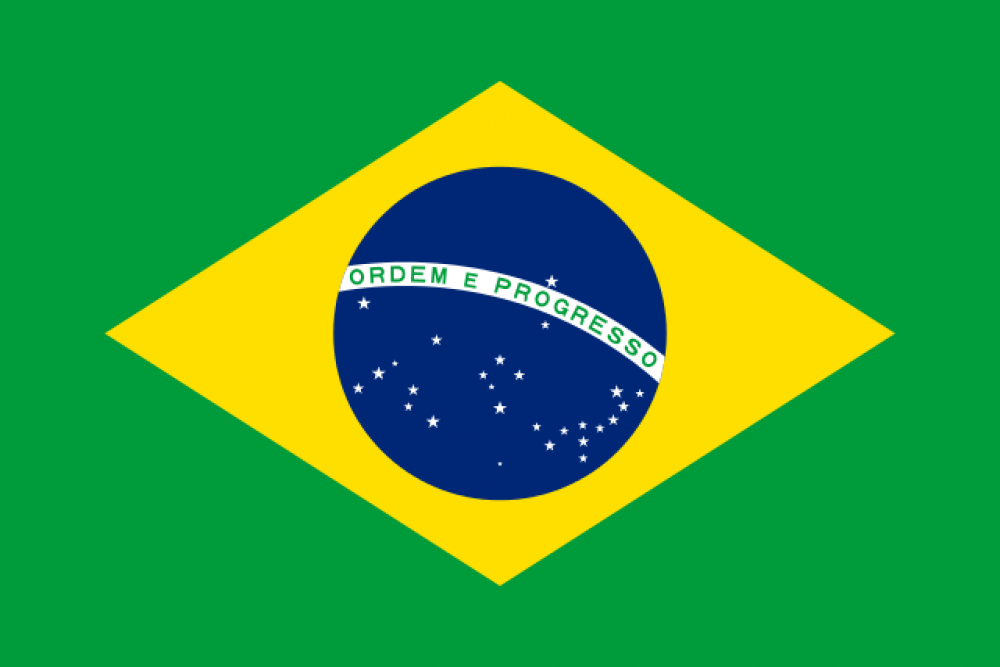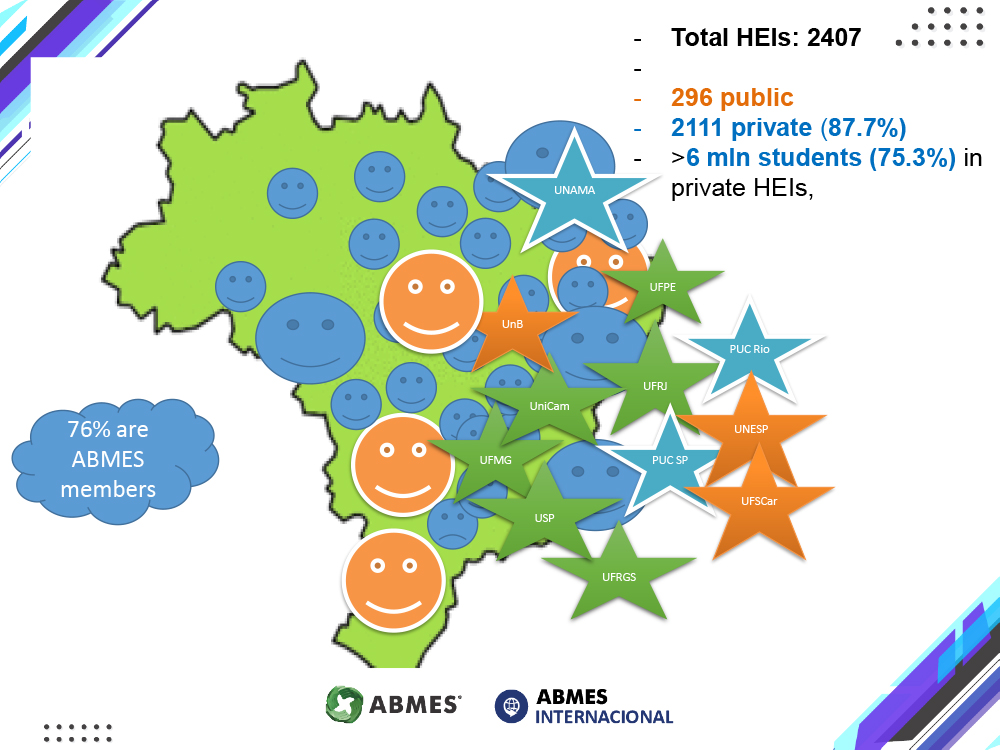The education system in Brazil
ABMES - Association of Brazilian Private Universities (Associação Brasileira de Mantenedoras de Ensino Superior)Global education
Русская версия
Brazil is a dynamically developing country that has made a quantum leap in the field of education for the last 20 years. High economic growth rates have contributed to the increase in the funding of the education sector which has led to positive changes.
At the end of the ХХ century the education system in the country underwent serious reforms. Brazil adopted the progressive law that determined the basics of the whole education system in the country – the National Education Guidelines and Framework Law (1996), the country implemented state educational programs aimed at increasing literacy rate and promoting scientific mobility. Most of the public investment spent on the development of education.
The full education cycle in Brazil includes the following levels: preschool, secondary (primary and secondary school), higher and vocational secondary education. Along with state educational institutions, there is a well-developed network of private educational institutions in Brazil. The quality of education almost fully depends on parents' financial possibilities and local public authorities.
Preschool education is not obligatory but is rather popular. Children under 6-7 can visit state (non-profit) nurseries and kindergartens or private ones that sometimes charge very high fees.
The first nine years of school education are compulsory and free. At the same time there are opportunities for private entrepreneurship. Since there is a problem of children's attendance, it is strictly controlled by parents and the administration of the state or municipalities. Today, a fairly large number of parents belonging to the middle-class send their children to private schools as they guarantee the better quality of education.
During the following three years at secondary school one can get vocational secondary education or just prepare for university. The state finances some technical schools that are regarded the best in Brazil. These educational organizations work according to the SESI and SENAI programs that supply workers with the skills needed in different industrial sectors.
Secondary education is sometimes insufficient for entering the university, so private lessons/courses for applicants (curinhos) are widely spread. Such services are provided by nonofficial organizations. Some of them give rather good knowledge.
The higher education system in Brazil is under strict control of the Ministry of Education. Each state has at least one university. There are 2,407 HEIs in Brazil (about 90% of them are private). Public universities are traditionally considered stronger due to enhanced funding.
 Photo: ABMES
Photo: ABMESTop universities in Brazil:
The University of São Paulo (USP) (www.usp.br)
Federal University of Rio de Janeiro (www.ufrj.br)
Federal University of Minas Gerais (www.ufmg.br)
University of Campinas (www.unicamp.br)
State University of Feira de Santana (www.uefs.br)
Federal University of Mato Grosso do Sul (www.ufms.br)
Final school exit exams (Exame Nacional do Ensino Médio, ENEM) are obligatory and also serve as the entrance exams to universities. At the same time, the results of individual interviews are of more importance for some universities. The number of vacancies in the public (state and federal) universities are very limited and young people from private schools, where the quality of education is higher, have better chances to get a place in free public universities.
ENEM is taken on two Sundays. On the first Sunday the exam lasts for 5.5 hours. It consists of 90 test assignments in the Portugal and English languages, history, geography, sociology, and philosophy. In addition, students write an essay. On the second Sunday the exam lasts for 4.5 hours. On this day it is necessary to complete 90 test assignments in exact and natural sciences: mathematics, physics, chemistry, biology. Like the Unified State Examination, the successful passing of ENEM (the score must be at least 700-800 out of 1,000) allows applicants to be accepted to the state-funded places at universities.
Many Brazilian universities are much younger than European HEIs but the level of teaching and the quality of education are quite competitive. The most popular specializations among Brazilian students are legal, medical, computer and engineering, marketing and journalism professions. The course of study for many professions lasts for five years. It can take two years to complete technical education.
The Brazilian universities are interested in talented students, so if they cannot pay for their studies, they can apply for benefits. Almost every university offers scholarships and grants to foreign applicants (students): social quote (quotes for Indians and students of African origin with low family income), public school quote (for those who origin from public schools).
There are two main student fundings to study in private universities:
ProUni scholarship. It does not need to be returned. To get this scholarship, the following conditions must be met: final school exams should have high score, family income should be low, and each semester control of the student’s records.
Funding Fies is actually a loan for low family income students with no interest from the Government and needs to be returned after the studies are finished.
ABMES is working together with the Government to sustain and diversify these student funds and other funding possibilities for students of the lower social level.
Only successful master and PhD students may get a scholarship from the Government for their excellent studies and effective research.
Higher education institutions in Brazil are divided into three categories:
- Universities (Universidades) are multi-course institutions that beside education have to conduct research, and must have at least one third of the teaching staff with PhD qualifications.
- University centers (Centro Universitário) are multi-course institutions that are not required but strongly encouraged to carryout research. They have autonomy to open new courses without seeking permission from the Ministry of Education.
- Faculdades are Higher Education institutions with less number of courses and specialized in certain areas and little autonomy and must obtain approval from the Ministry of Education when opening new courses, certificates, or degrees.
In Brazil, degrees known as graduação:
- Bachelor’s (bacharelado): varies between 3 to 6 years to complete. Enables individuals to act as professionals in a certain area (e.g., lawyer, economist, physician).
- Licentiate (licenciatura): varies between 3 to 4 years to complete. Enables individuals to act as elementary or secondary school teachers in a certain area (e.g., licensed teacher of Math, English, Biology, etc.).
- Technology (tecnologia - Cursos técnicos de curta duração): varies between 2 to 3 years of full time studies to complete. This degree takes a shorter period of time to obtain, with specific professional courses aimed at providing highly specialized knowledge (e.g., agribusiness technical degree, tourism management degree, etc.).
In Brazil, degrees known as pós-graduação:
- “Lato sensu postgraduate” degree: this degree represents a specialization in a certain area, and takes approximately 1 to 2 years to complete. MBA programs in Brazil are classified as lato sensu programs. Students having this degree cannot pursue their doctoral studies. If one is interested in a PhD, a strictu sensu master’s degree should be taken instead.
- “Stricto sensu postgraduate” degree: this degree enables one to pursue an academic career. In chronological order:
- Master’s degree (mestrado): this takes 1 to 2 years of full time studies to complete. Often, a Master’s degree serves as an additional qualification for those in the job market, or for those who want to pursue a PhD. A stricto sensu master’s degree in management is the equivalent of a full time MBA in North America.
- Doctoral degree / PhD (doutorado): from 3 to 4 years. Usually used for future careers in science.
Academic titles in Brazil:
- The school teachers are called "Professors".
- Those with PhDs are called “Prof Dr”.
- Those who have been habilitated are called “Professor Livre Docente”
The Brazilian system of higher education has no uniform educational standards. All programs serve as guidelines. Upon completion of their studies students confirm their proficiency level taking a special exam at a relevant professional or industry association. Instead of a traditional diploma, a specialist is assigned a personal cadastral number.
Applicants are encouraged by the fact that there is still a disastrous shortage of highly qualified specialists in Brazil. Therefore, they are in great demand, and their salary is quite decent.
 | For guidance and support the editors are grateful to Prof Dr Lioudmila Batourina International Partnership Consultant Brazilian Association of Private Universities (ABMES) |
ABMES is the leading National Association of private HEIs (more than 1500), representing them in the government and contributing to the strengthening of the Brazilian higher education. ABMES has its own TV station, journals, organizers webinars and on-line courses, conducts national and international events, including Delegations to different countries, launches competitions for social projects and journalism in the area of education. ABMES also serves as the central information and partner search point for international projects. For potential international partners ABMES is ONE door to MANY Universities.
Other sources:
https://vseobr.com/sistemy-obrazovanija/brazilija/
https://biznes-prost.ru/obzor-sistemy-obrazovaniya-brazilii.html
